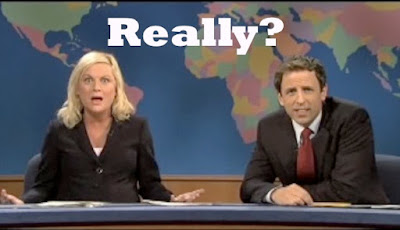*Bear with me on this one gang*
There seems to be a trend in media and culture and general
public life towards dumbing down, or rather, pandering to the lowest common
denominator. It’s something I’ve been especially aware of in the last 12
months, particularly with the UK General Election last May, and with the
current US primary season underway.
During both campaigns I’ve failed to resist making comparisons
to President Bartlett’s campaign for a second term (BARTLET FOR AMERICA!) in The
West Wing. To win the campaign Toby persuades the President not to speak down
to the electorate, but to appeal to the best and smartest side of them. He proceeds
run and win a campaign which aspires to what we could be and what we could
achieve, by appealing to our better angels. This seems like how we should all
aspire to be; it’s certainly how I’d like to think of the media in an ideal
world.

But alas, the West Wing takes place in an ideal, parallel
universe in which Rob Lowe is a beautiful liberal hero (Can I PLEASE switch to
that Universe?). Instead we have David Cameron winning an election by basically
repeating the phrase, “long term economic plan” until our ears bleed, and
Donald Trump winning primaries by praying on fear and bringing out the worst of
us. The result? Those who can see through the slogans and partisan point
scoring to see complex issues and solutions, are completely turned off
politics. It’s so frustrating because it makes it hard to tell if anyone
actually knows what they’re doing, if even the smartest politician dumbs
themself down (Ed Miliband, I'm looking at you). Where did the bravery, optimism and hope that brought us the
NHS, the New Deal and the United Nations disappear to?
I could (and have done) write an essay on politics and
popular culture so this is the last I’ll say on the matter I promise! For years
politics wasn’t really affected by popular culture. It was in a realm above it,
and saw itself as far too important
to involve itself in such matters. But in the age of mass media the overlap is seemingly
impossible to avoid. It’s escalated to the level of Donald Trump, who is
clearly a reality TV show contestant, and you can almost hear the sinking
hearts of the GOP elite as this begins to dawn on them. But again, I’ll save
that for another day before I get carried away! Back to the media and stuff.
It’s hard to quantify when the shift towards dumbing down
culture began- partly due to my being born in 1993 and the difficulty in
studying the whole of the media,
which is huge, but I’ve got an inkling the rise of neoliberalism from the late
1970’s onwards has something to do with it (it usually does).
I link this to neoliberalism simply because it gave rise to
two media explosions; 24 hour news and later talent shows such as Britain’s Got Talent. Both are examples
of mass media which have become global cultural phenomena. To be successful on
both a national and international scale- something only possible due to recent
technology- they must appeal to a huge audience. This need to appeal to wider
and wider audiences I think goes some way in explaining the dumbing down of
media.
So, how does this
relate to neoliberalism? Executive’s attempts to appeal to as many people as
possible is no accident. It’s part of the marketization of culture which has
resulted in culture having to justify its existence through its ability to make
money. Currency of culture switched to money rather than art for the sake of
art. Basically, they’re so scared to exclude anybody they end up aiming low
enough that they catch all.
But this raises two questions, why do executives feel they
should appeal to our lowest; why not aspire to elevate the public? And
secondly, why does low brow culture now appeal everyone, including elites?
1. I’m
not a psychologist but I imagine this just comes from fear. Writers must be
under unbelievable pressure to produce commercially successful shows, so taking
a leap of faith must be too risky. Imagine if we could all BE BRAVE?
2. The
upper classes used to be cultural snobs i.e., they were exclusively into Opera
and classical music, but now they’re more like cultural omnivores with a truly
democratic taste being most desirable (that’s why I don’t mind saying I like
One Direction and Billie Holiday for
example). I think this is one of the key changes. Whereas ‘trash’ TV used to be
frowned upon- it’s low brow after all- it’s now embraced by upper, middle and
working classes.

So if you’re on my wavelength, it’s starting to look like
we have a chicken and egg situation on our hands. What came first; the
democratisation of culture or its dumbing down? *I wish I had chosen this as my
dissertation question. Better late than never* In politics we’ve seen a race to
the centre since the 1990’s, and the same is true of the media. In politics,
the hope is to appeal to as many people in the middle ground as possible (where
most people are) to win as many votes as possible. In the media the aim is to
appeal to as many people as possible and offend as few people as possible to
make as much money as possible. Ta- daaaaaaaaa! We got there in the end didn’t
we.
In my follow- up I
will ask, ‘Are the world’s media and
political elite just needy people pleasers craving acceptance from as many of
us as possible?’








